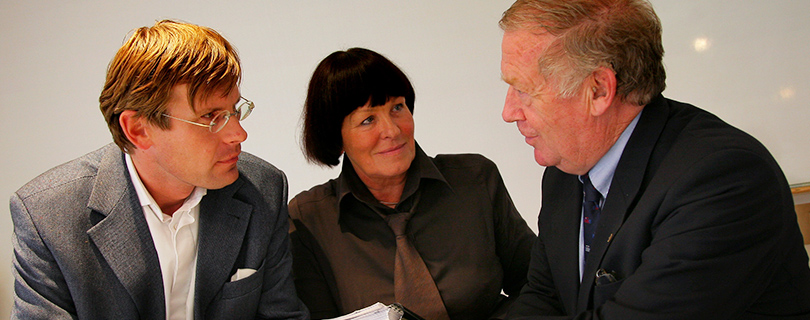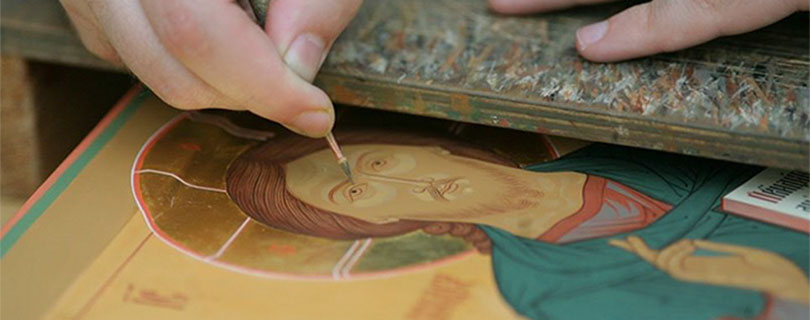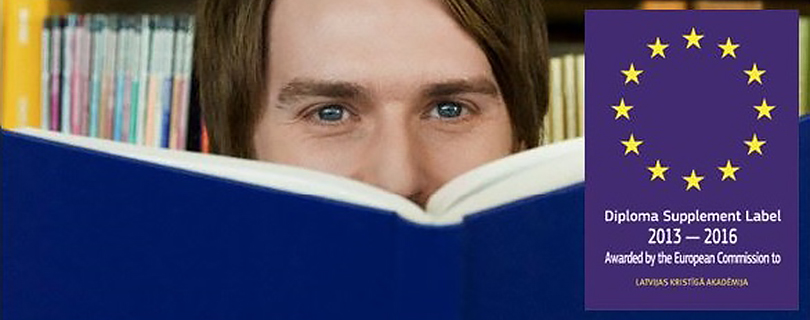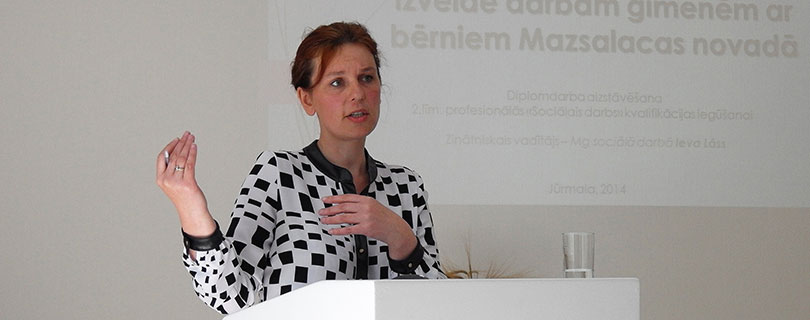Study Year 2025 / 2025
The courses will be offered on Bachelor and Master levels and will cover such areas of studies as:
Caritative Social Work, Social Work, Church (Biblical) Art.
At European Christian Academy the system is fairly flexible, but participation in courses may be subject to preconditions or restrictions in some cases, please ask for information at your home institution ERASMUS office or contact us.
On the whole the courses are held in English. The language improvement courses are provided at the Academy through out the study year and for ERASMUS students are free of charge.
The deadline for submission an application for Autumn semester is July 1, 2025.
The deadline for submission an application for Spring semester is December 1, 2025.
Should the information not yet be available, but you are interested in studies at our Academy, please contact ERASMUS coordinator: Beata Soloveja: erasmus@kra.lv or call +371 67753360.
Academic calendar
Autumn semester 2025: September 10, 2025 – December 19, 2025.
Spring semester 2026: January 12, 2026 – May 31, 2026.
International Course in English
Caritative Social Work with Marginal and Addictive Persons
10 credit points / 15 ECTS credits. Language: English
The goal of the course is to provide knowledge and skills of caritative social work to those working with persons from different social risk groups (homeless people, long-term jobless people, people in poverty, former prisoners and others) and with people who suffer from addictions. Course is oriented practically and provide new resources for social rehabilitation of these groups of people, and is oriented both for volunteers and those working in social sphere who want to profound their professional competence with learning the caritative social work approach.
The contents of the course
The course deals with learning specifics of marginal and addictive persons and the methods and approaches how to work with them in a caritative social work way. Caritative social work is anthropologically-driven approach that deals with inner resources of a person and is oriented toward social and spiritual renovation of a person. Therefore the course discusses themes like human thinking, emotions and behavior in different age phases, social exclusion and inclusion of marginalized persons, social security system and social legislation, addictions and their causes, psychiatry, human trafficking, sexual health of young persons. Methods of intervention are taught with such subjects as caritative social work method, community social work, methods of crisis intervention. The course pays special attention to social teaching of the Church and work with socially marginal groups, and caritative work with person’s mental pathologies. The course is set to provide knowledge and skills that would be oriented on personality growth, spiritual stabilization and building motivation for changes.
Learning outcomes
- To obtain more profound holistic understanding about a human being and his\hers inner resources in solving social exclusion
- To build understanding about deeper psychological, anthropological causes of social exclusion and addictions
- To train skills to evaluate in a complex way the needs, potential of personality and direction of intervention in situation of social problem by helping to build the skills of self-dependency of people in problem solving.
- To develop skills to perform caritative social work assistance according to the needs of a person.
Learning methods
The course goals are achieved mainly by lectures, group work, case analysis, seminars and discussions, self-learning tests and their analysis, role plays.
Application and Contacts
Course takes place from 10 September – 30 November 2025.
Tuition fee for non-Erasmus students – EUR 800
Contacts – Valters Dolacis, international studies coordinator, erasmus@kra.lv, phone +371 67753360
ERASMUS COURSE CATALOGUE
(Available for visiting students)
Explanatory notes:
B – Bachelor degree,
M – Master degree,
Sem. 1 – Semester 1 (fall – winter),
Sem. 2 – Semester 2 (winter – spring),
ESS – 1500 words essay,
EX – 90 minutes exam,
RESS.P – Practical research using methodology.
1. A Bachelor of humanities in arts (BMB) degree and a Master of humanities in arts degree (BMM) study modules (30 ECTS each) can be taken at the Department of Church (Biblical) art studies.
The Bachelor study module includes:
- Iconography module,
- Classical drawing,
- Classical painting,
- Calligraphy.
|
Name of the subject |
Course code |
ECTS credits |
Degree |
Term |
Test form |
| Iconography | BMB 1.5 |
10 |
B |
Sem. 1 | Exhibited works |
| Classical drawing | BMB 1.11 |
6 |
B |
Sem. 1 | Exhibited works |
| Classical painting | BMB 1.13 |
6 |
B |
Sem. 1 | Exhibited works |
| Calligraphy | BMB 2.01 |
8 |
B |
Sem. 2 | Exhibited works |
The Master study module includes:
- Schools of iconography,
- Calligraphy,
- History of canonical Byzantine iconography.
|
Name of the subject |
Course code |
ECTS credits |
Degree |
Term |
Test form |
| Iconography schools | BMM 3.10 |
10 |
M |
Sem. 1 | Exam-grade |
| Calligraphy | BMB 3.01 |
10 |
M |
Sem. 1 | Exam-grade |
| History of canonical Byzantine iconography | BMB 3.07 |
10 |
M |
Sem. 2 | Exam-grade |
2. A Bachelor in caritative social work studies (KSDB) and Master in caritative social work studies (KSDM) study modules (30 ECTS each) can be taken at the Department of caritative social work studies.
The Bachelor study module includes:
- Caritative social work with a case,
- Methodology of caritative social work,
- Preventive caritative social work,
- Caritative theology and social work practice,
- Social teaching of the Church,
- Caritative social work with pathologies of human consciousness,
- Caritative social work with prisoners,
- Geronthological caritative social work.
|
Name of the subject |
Course code |
ECTS credits |
Degree |
Term |
Test form |
| Caritative social work with a case | KSDB 2.1 |
4 |
B |
Sem. 1 | Exam-grade |
| Methodology of caritative social work | KSDB 2.6 |
6 |
B |
Sem. 1 | Exam-grade |
| Caritative theology and social work practice | KSDB 3.3 |
4 |
B |
Sem. 1 | ESS |
| Social teachings of the Church | KSDB 3.15 |
6 |
B |
Sem. 1 | EX |
| Preventive caritative social work | KSDB 3.9 |
2 |
B |
Sem. 1 | ESS |
| Caritative social work with pathologies of human consciousness | KSDB 3.18 |
4 |
B |
Sem. 2 | ESS |
| Caritative social work with prisoners | KSDB 3.25 |
2 |
B |
Sem. 2 | Exam-grade |
| Geronthological caritative social work | KSDB 3.20 |
2 |
B |
Sem. 2 | Exam-grade |
The Master study module includes:
- Caritative social work in context of European social agenda,
- Integration of social doctrine of the Church,
- Methodology of integrative theology,
- Patristic anthropology,
- Social economy and caritative social work,
- Theology of caritas,
- Caritative social work as object of research.
|
Name of the subject |
Course code |
ECTS credits |
Degree |
Term |
Test form |
| Caritative social work in the context of European social agenda | KSDM 1.1 |
2 |
M |
Sem. 1 | EX |
| Integration of social doctrine of the Church | KSDM 1.7 |
4 |
M |
Sem. 1 | EX |
| Methodology of integrative theology | KSDM 2.2 |
4 |
M |
Sem. 1 | EX |
| Patristic anthropology | KSDM 1.8 |
6 |
M |
Sem. 1 | EX, ESS |
| Social economy and caritative social work | KSDM 2.4 |
6 |
M |
Sem. 2 | EX |
| Theology of caritas | KSDM 2.7 |
3 |
M |
Sem. 2 | EX, ESS |
| Caritative social work as object of research | KSDM 2.3 |
3 |
M |
Sem. 2 | EX, RESS.P |
Academic calendar.
Autumn semester 2025:
September 10, 2025 – December 19, 2025.
Spring semester 2023:
January 12, 2026 – May 31, 2026.
Introduction week at ECA:
Please contact Study department Mrs. Agnese Sējāne (akademija@kra.lv).
- Students are given an overview about the ECTS credits as a workload for students needed in order to achieve expected learning outcomes as well as the structure of the study program me selected,
- Learning outcomes for each study course and module as total describe what a learner is expected to know, understand and be able to do after successful completion of a processor learning,
- Information about credits to be awarded after completion of the learning activities,
- Credit transfer and accumulation are facilitated by the use of the ECTS key documents (Course catalogue, Student application form, Learning agreement and Transcript of records),
- Full information on studying in Latvia – our international student guidance is offered in English or Russian.
Language tests:
ECA Study department (English tests),
Educaton advising centre (TOEFL test).
Tests of the level:
- A1 (Elementary level),
- A2 (Basic level),
- B1 (TOEFL – 1)
- B2 (TOEFL – 2)
- C1 (TOEFL-3)
- C2 (TOEFL-4)
System of language masterly levels is created by the Council of Europe / Description of levels.
Preparation:
Consultations at the ECA Study department.
Carrying out tests:
Registration. Testing. Results of the tests and Certificate: ECA Study department.
ERASMUS partner universities and organizations.
ECA has signed bilateral and ERASMUS+ agreements with:
- Ben-Gurion University of the Negev (IL),
- VID Specialized University (NO),
- University of Tartu (EE),
- Vilnius Vytautas Magnus University (LT),
- Vilnius University of Pedagogical Sciences (LT),
- Vilnius Academy of Art (LT),
- Kaunas Academy of Art (LT),
- Jan Matejko Art Academy of Krakow (PL),
- Strzeminski Art Academy of Lodz (PL),
- University of Bethlehem (IL, Palestine),
- St. Georgen Univeristy of Philospohy and Theology (DE),
- Klaipeda University (LT),
- University of Babes-Bolyai (RO),
- Ignatio Loyola University of Applied Sciences (LT),
- Kaunas University of Applied Sciences (LT),
- Kolpingo University of Applied Sciences (LT),
- Российский Государственный Социальный Университет (RSSU) (RU),
- Semmelweis University (HU),
- Aristotle University, Thessaloniki (GR),
- University of Bethlehem (PA),
- VIA University College (DK),
- EDE Christian University of Applied Sciences (NE),
- DIAK Polytechnic – Diakonia University of Applied Sciences (FIN),
- OAC – Orthodox Academy of Crete (GR),
- Ansgar Theological Seminary and highschool (NO),
- University of Pecs (HU),
- Catholic University in Ruzenberok (SL),
- KatHO NRW – Catholic University of Applied Sciences of North Rhine-Westphalia (DE),
- University of Oradea (RO),
- Istanbul Gedik University (TR),
- Sofia University of St. Climent of Ohrid (BU).
Placements:
- Israel Antiquities Authority (IL),
- The Rockefeller Museum (IL),
- ETOK (Estonian platform for entrepreneurs and workers) (EE),
- EZA (European center for Workers’ Questions) (DE),
- LDF (Lithuanian Labor federation) (LT),
- OAC – Orthodox Academy of Crete (GR),
- PVMC (Project management and lifelong learning centre) (LT),
- International Social Academy (ISA) (LT),
- ICAA (International Christian Artists’ association, 5 organizations) (NE),
- Continental Art Centre (European Christian Artists’ association) (NL),
- EUROFEDOP (BE),
- EESTI MIGRATSIOONIFOND (EE),
- Icon Museum in Recklighausen (DE),
- The Swedish Alliance Mission (SE),
- Catholic Social institute (KSI) (CZ),
- Academy for Development and Demcocracy (MT).



